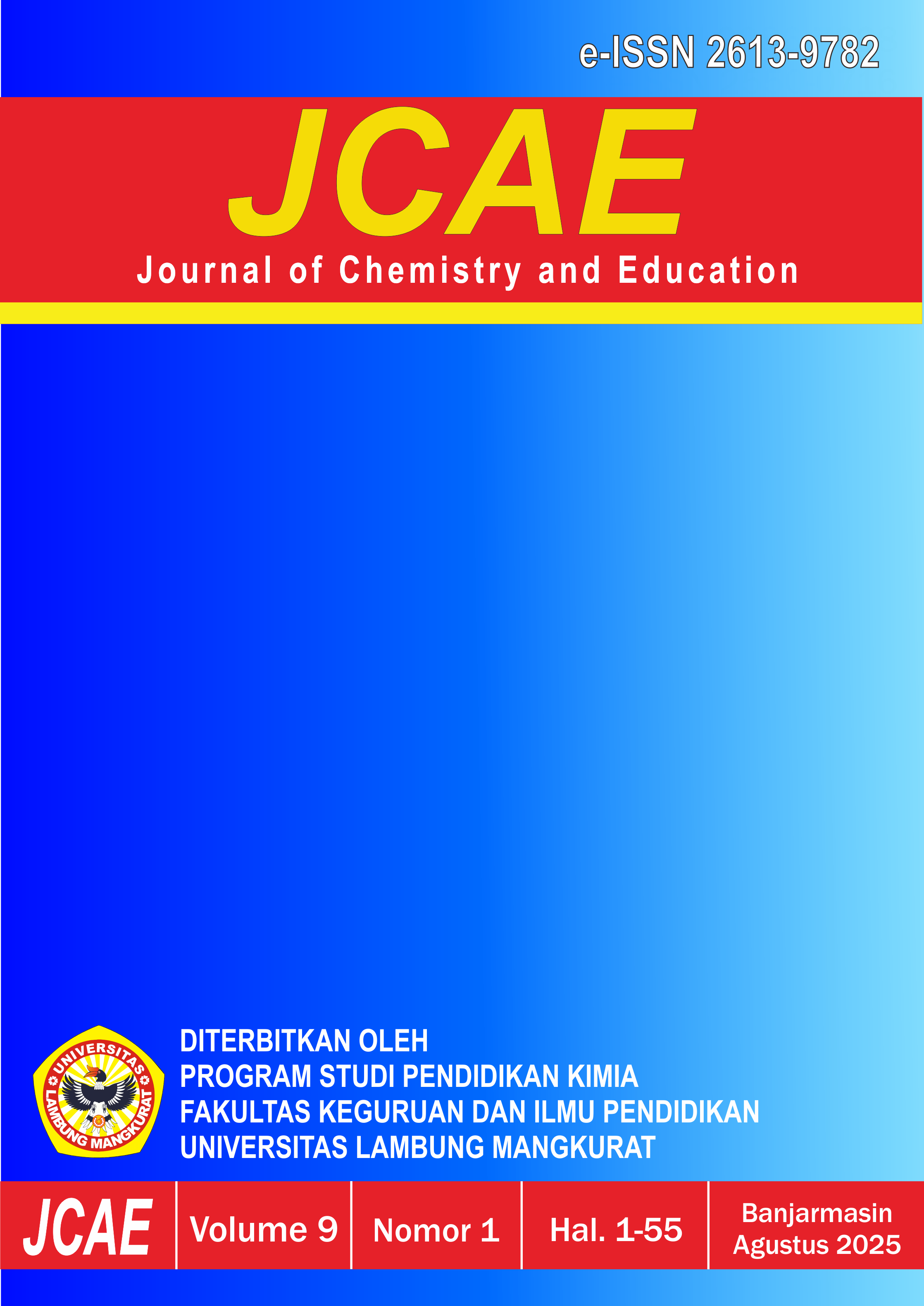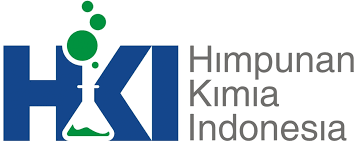PENGEMBANGAN E-MODUL HIDROKARBON BERBASIS PROBLEM BASED LEARNING MENGGUNAKAN HEYZINE FLIPBOOK UNTUK MENINGKATKAN MOTIVASI BELAJAR DAN LITERASI SAINS
DEVELOPMENT OF HYDROCARBON E-MODULE WITH PROBLEM-BASED LEARNING USING HEYZINE FLIPBOOK TO INCREASE LEARNING MOTIVATION AND SCIENCE LITERACY
Abstract
Tingkat literasi sains dan motivasi belajar peserta didik yang rendah menunjukkan perlunya pengembangan bahan ajar. Penelitian ini bertujuan mengembangkan e-modul berbasis Problem Based Learning (PBL) pada materi hidrokarbon menggunakan website Heyzine Flipbook. E-modul diharapkan memenuhi kriteria kevalidan, kepraktisan, dan keefektifan untuk meningkatkan literasi sains dan motivasi belajar peserta didik. Metode yang digunakan adalah Research and Development (R&D) dengan model ADDIE, meliputi Analisis, Desain, Pengembangan, Implementasi, dan Evaluasi. Subjek penelitian terdiri dari 32 peserta didik kelas XIA dan 33 peserta didik kelas XIB di SMAN 3 Banjarmasin. Data dikumpulkan melalui validasi media, angket, observasi, dan tes. Hasil menunjukkan: (1) e-modul valid dengan skor 96,49%; (2) kepraktisan 92,63% (XIA) dan 92,84% (XIB); (3) keefektifan N-Gain motivasi belajar 0,88 (XIA) dan 0,78 (XIB), serta N-Gain literasi sains 0,80 (XIA) dan 0,84 (XIB), semua dalam kategori tinggi. E-modul dinyatakan valid, praktis, dan efektif untuk pembelajaran kimia pada materi hidrokarbon serta berpotensi meningkatkan motivasi belajar dan literasi sains peserta didik.
References
Ahmad, A. P., Daud, F., & Bahri, A. (2022). HUBUNGAN MOTIVASI BELAJAR DENGAN KEMAMPUAN LITERASI SAINS SISWA KELAS XII SMA NEGERI 2 LUWU PADA MATERI SISTEM KOORDINASI.
Al Faruq, M. S. S., Sunoko, A., Rozi, M. A. F., & Salim, A. (2024). Enhancing Educational Quality through Principals’ Human Resources Management Strategies. AL-ISHLAH: Jurnal Pendidikan, 16(2), 1108–1117. https://doi.org/10.35445/alishlah.v16i2.5042
Almulla, M. A. (2020). The Effectiveness of the Project-Based Learning (PBL) Approach as a Way to Engage Students in Learning. Sage Open, 10(3). https://doi.org/10.1177/2158244020938702
Arikunto, & Suharsimi. (2006). Prosedur Penelitian suatu Pendekatan Praktik. PT. Rineka Cipta.
Ashari, L. S., & Puspasari, D. (2024). Pengembangan E-Modul Berbasis Heyzine Flipbook pada Mata Pelajaran Otomatisasi Humas dan Keprotokolan di SMKN 2 Buduran Sidoarjo. INNOVATIVE: Journal Of Social Science Research, 4(1), 2565–2576. https://doi.org/10.31004/innovative.v4i1.8126
Asri, A. S. T., & Dwiningsih, K. (2022). Validitas E-Modul Interaktif sebagai Media Pembelajaran untuk Melatih Kecerdasan Visual Spasial pada Materi Ikatan Kovalen. PENDIPA Journal of Science Education, 6(2), 465–473. https://doi.org/10.33369/pendipa.6.2.465-473
Bruehl, M., Pan, D., & Ferrer-Vinent, I. J. (2015). Demystifying the Chemistry Literature: Building Information Literacy in First-Year Chemistry Students through Student-Centered Learning and Experiment Design. Journal of Chemical Education, 92(1), 52–57. https://doi.org/10.1021/ed500412z
Dayanti, F., Sundaygara, C., & Pranata, K. B. (2021). PENERAPAN MODEL PEMBELAJARAN CREATIVE PROBLEM SOLVING UNTUK MENINGKATKAN LITERASI SAINS DAN MOTIVASI SISWA. Rainstek Jurnal Terapan Sains Dan Teknologi, 2(4), 333–341. https://doi.org/10.21067/jtst.v2i4.4924
Dwikoranto, Dawana, I. R., & Setiani, R. (2023). Validity of Teaching Modules with Problem-Based Learning (PBL) Model Assisted by E-Book to Improve Problem-Solving Skills on Renewable Energy Material and Implementation of Independent Learning Curriculum. Journal of Physics: Conference Series, 2623(1), 012015. https://doi.org/10.1088/1742-6596/2623/1/012015
Fukuzawa, S., Boyd, C., & Cahn, J. (2017). Student Motivation in Response to Problem-based Learning. Collected Essays on Learning and Teaching, 10, 175–188. https://doi.org/10.22329/celt.v10i0.4748
Haspen, C. D. T., Syafriani, S., & Ramli, R. (2021). Kevalidan e-modul fisika sma berbasis inkuiri terbimbing terintegrasi etnosains untuk meningkatkan kemampuan berpikir kreatif peserta didik. Jurnal Eksakta Pendidikan (Jep), 5(1), 95-101. https://doi.org/10.24036/jep/vol5-iss1/548
Herlina, H. (2020). Penerapan Problem Based Learning Untuk Meningkatkan Hasil Belajar Kimia Pada Materi Hidrokarbon. PENDIPA Journal of Science Education, 4(3), 7–13. https://doi.org/10.33369/pendipa.4.3.7-13
Ke, L., Sadler, T. D., Zangori, L., & Friedrichsen, P. J. (2021). Developing and Using Multiple Models to Promote Scientific Literacy in the Context of Socio-Scientific Issues. Science & Education, 30(3), 589–607. https://doi.org/10.1007/s11191-021-00206-1
Kusmaryono, I., Wijayanti, D., & Maharani, H. R. (2022). Number of Response Options, Reliability, Validity, and Potential Bias in the Use of the Likert Scale Education and Social Science Research: A Literature Review. International Journal of Educational Methodology, 8(4), 625–637. https://doi.org/10.12973/ijem.8.4.625
Li, X., Liu, W., & Hu, K. (2023). Learning motivation and environmental support: how first-generation college students achieve success? Frontiers in Psychology, 14. https://doi.org/10.3389/fpsyg.2023.1280783
Magnus, D. de M., Carbonera, L. F. B., Pfitscher, L. L., Farret, F. A., Bernardon, D. P., & Tavares, A. A. (2020). An Educational Laboratory Approach for Hybrid Project-Based Learning of Synchronous Machine Stability and Control: A Case Study. IEEE Transactions on Education, 63(1), 48–55. https://doi.org/10.1109/TE.2019.2956909
Maharani, D. S., & Fathurrahman, Moh. (2025). Development of an PBL-Based Augmented Reality Media for Enhanced Social and Natural Science Learning Outcomes in Elementary School Students. Jurnal Pendidikan Progresif, 15(1), 360–374. https://doi.org/10.23960/jpp.v15i1.pp360-374
Martin, F., & Bolliger, D. U. (2018). Engagement Matters: Student Perceptions on the Importance of Engagement Strategies in the Online Learning Environment. Online Learning, 22(1). https://doi.org/10.24059/olj.v22i1.1092
Meng, N., Dong, Y., Roehrs, D., & Luan, L. (2023). Tackle implementation challenges in project-based learning: a survey study of PBL e-learning platforms. Educational Technology Research and Development, 71(3), 1179–1207. https://doi.org/10.1007/s11423-023-10202-7
Nicholus, G., Muwonge, C. M., & Joseph, N. (2023a). The Role of Problem-Based Learning Approach in Teaching and Learning Physics: A Systematic Literature Review. F1000Research, 12, 951. https://doi.org/10.12688/f1000research.136339.2
Nicholus, G., Muwonge, C. M., & Joseph, N. (2023b). The Role of Problem-Based Learning Approach in Teaching and Learning Physics: A Systematic Literature Review. F1000Research, 12, 951. https://doi.org/10.12688/f1000research.136339.2
Norzatiah, N., Mahdian, M., & Istyadji, M. (2022). MENINGKATKAN MOTIVASI DAN HASIL BELAJAR PESERTA DIDIK MELALUI PENERAPAN MODEL DISCOVERY LEARNING BERBANTUAN MEDIA E-BOOK PADA MATERI HIDROKARBON KELAS XI. JCAE (Journal of Chemistry And Education), 6(1), 22-30. https://doi.org/10.20527/jcae.v6i1.1601
O’Connor, S., Power, J., Blom, N., & Tanner, D. (2024). Engineering students’ perceptions of problem and project-based learning (PBL) in an online learning environment. Australasian Journal of Engineering Education, 29(2), 88–101. https://doi.org/10.1080/22054952.2024.2357404
Orji, C. T., & Ogbuanya, T. C. (2022). Mediating roles of ability beliefs and intrinsic motivation in PBL and engagement in practical skills relations among electrical/electronic education undergraduate. Innovations in Education and Teaching International, 59(3), 326–336. https://doi.org/10.1080/14703297.2020.1813188
Putri, A. V., Naufal, A. P., Aisya, S., Hajron, K. H., & Suryawan, A. (2022). Peningkatan Hasil Belajar PKn Melalui Model Problem based learning (PBL) Pada Siswa SD Negeri 2 Gandulan. Prosiding Konferensi Ilmiah Dasar, 3, 1600-1609.
Rahayu, I., & Sukardi, S. (2021). The Development Of E-Modules Project Based Learning for Students of Computer and Basic Networks at Vocational School. Journal of Education Technology, 4(4), 398. https://doi.org/10.23887/jet.v4i4.29230
Raman, Y., Surif, J., & Ibrahim, N. H. (2024). The Effect of Problem Based Learning Approach in Enhancing Problem Solving Skills in Chemistry Education: A Systematic Review. International Journal of Interactive Mobile Technologies (IJIM), 18(05), 91–111. https://doi.org/10.3991/ijim.v18i05.47929
Rehman, N., Huang, X., Mahmood, A., AlGerafi, M. A. M., & Javed, S. (2024). Project-based learning as a catalyst for 21st-Century skills and student engagement in the math classroom. Heliyon, 10(23), e39988. https://doi.org/10.1016/j.heliyon.2024.e39988
Sa’adah, M., Suryaningsih, S., & Muslim, B. (2020). Pemanfaatan multimedia interaktif pada materi hidrokarbon untuk menumbuhkan keterampilan berpikir kritis siswa. Jurnal Inovasi Pendidikan IPA, 6(2), 184–194. https://doi.org/10.21831/jipi.v6i2.29680
Shraim, K. (2019). Online Examination Practices in Higher Education Institutions: Learners’ Perspectives. Turkish Online Journal of Distance Education, 20(4), 185–196. https://doi.org/10.17718/tojde.640588
Siregar, T. R. A., Iskandar, W., & Rokhimawan, M. A. (2020). LITERASI SAINS MELALUI PENDEKATAN SAINTIFIK PADA PEMBELAJARAN IPA SD/MI DI ABAD 21. MODELING: Jurnal Program Studi PGMI, 7(2).
Situmorang, R. M., Muhibbuddin, & Khairil. (2015). PENERAPAN MODEL PEMBELAJARAN PROBLEM BASED LEARNING UNTUK MENINGKATKAN HASIL BELAJAR SISWA PADA MATERI SISTEM EKSKRESI MANUSIA. Jurnal EduBio Tropika, 2.
Triwahyuningtyas, D., Ningtyas, A. S., & Rahayu, S. (2020). The problem-based learning e-module of planes using Kvisoft Flipbook Maker for elementary school students. Jurnal Prima Edukasia, 8(2), 199–208. https://doi.org/10.21831/jpe.v8i2.34446
Utami, F. P., & Setyaningsih, E. (2022). KEMAMPUAN LITERASI SAINS PESERTA DIDIK MENGGUNAKAN PEMBELAJARAN PROBLEM BASED LEARNING PADA MATERI SISTEM EKSKRESI. Journal of Educational Learning and Innovation, 2(2), 240. https://doi.org/10.46229/elia.v2i2
Widyastuti, E., & Susiana. (2019). Using the ADDIE model to develop learning material for actuarial mathematics. Journal of Physics: Conference Series, 1188, 012052. https://doi.org/10.1088/1742-6596/1188/1/012052
Wulandari, F., Yogica, R., & Darussyamsu, R. (2021). ANALISIS MANFAAT PENGGUNAAN E-MODUL INTERAKTIF SEBAGAI MEDIA PEMBELAJARAN JARAK JAUH DI MASA PANDEMI COVID-19. Khazanah Pendidikan, 15(2), 139. https://doi.org/10.30595/jkp.v15i2.1080
Copyright (c) 2025 JCAE (Journal of Chemistry And Education)

This work is licensed under a Creative Commons Attribution-NonCommercial-NoDerivatives 4.0 International License.











